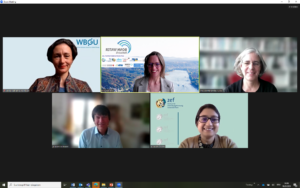Experts at the Bonn Water Network event discussed how global governance can address the water crisis in a political climate marked by geopolitical interests. They highlighted the need for a new International Water Strategy and formulated recommendations.

The world is not on track to meet Sustainable Development Goal 6 on Clean Water and Sanitation, and extreme weather events such as droughts and floods are increasing. The Bonn Water Network event, which took place online on 10 March 2025, brought high-level experts together to discuss how global governance can address the water crisis in a political climate marked by geopolitical interests.
IDOS director Prof. Anna- Katharina Hornidge started with a short input on the results of the recent flagship report of the German Advisory Council on Global Change (WBGU) „Water in a heated world“. In the face of water emergencies beyond the spectrum of human experience, she called for strengthening international water governance with a new International Water Strategy at UN level and climate-resilient, cross-sectoral and socially balanced water management.
Panellist Dr Cullmann, head of unit International Collaboration at the German Federal Institute of Hydrology and former Vice-Chair of UN-Water, reflected on recent developments in and future perspectives for global water governanceGiven the challenge of the fragmentation of institutional landscape with over 30 water-relevant UN institutions, he called for a stronger role of UN water and interest-based coalitions of member countries to advance global cooperation.
Prof. Ines Dombrowsky, head of the Department ‘Environmental Governance’ at IDOS formulated key recommendations based on her co-authored paper “Empowering global water governance: taking the 2023 UN Water Conference outcomes forward to address the current water crises”. She called for a water-specific science–policy–society platform at global level, noted that the cross-sectoral nature of water needs to be addressed including in international agreements, and that better monitoring of global water commitments would also improve its legitimacy.
Prof. Anindita Sarkar, Senior Researcher at Department of Ecology and Natural Resources Management at Center for Development Research (ZEF), University of Bonn, discussed the local implementation of global concerns in the field of groundwater governance with examples from India. She pointed to the water-energy-food needed for sustainable water management, and argued for locally adapted solutions.
Dr Annabelle Houdret, senior researcher at IDOS and speaker of the Bonn Water Network, moderated the event and the debate with the international audience including researchers, practitioners and representatives of civil society members.
The Bonn Water Network is an initiative of eleven institutions (United Nations University – Institute for Environment and Human Security (UNU-EHS), Center for Development Research (ZEF), Environmental Law Centre of IUCN, Department of Geographie (GIUB), German Institute of Development and Sustainability (IDOS), Bonn International Centre for Conflict Studies (BICC), Institute for Hygiene and Public Health (IHPH), United Nations Human Settlement Programme/Global Water Operators‘ Partnerships Alliance (UN-Habitat/GWOPA), United Nations Convention to Combat Desertification (UNCCD), Water Integrity Network (WIN), International Centre for Water Resources and Global Change (ICWRGC)) involved in research and policy advice on and implementation of water solutions.

Schreibe einen Kommentar